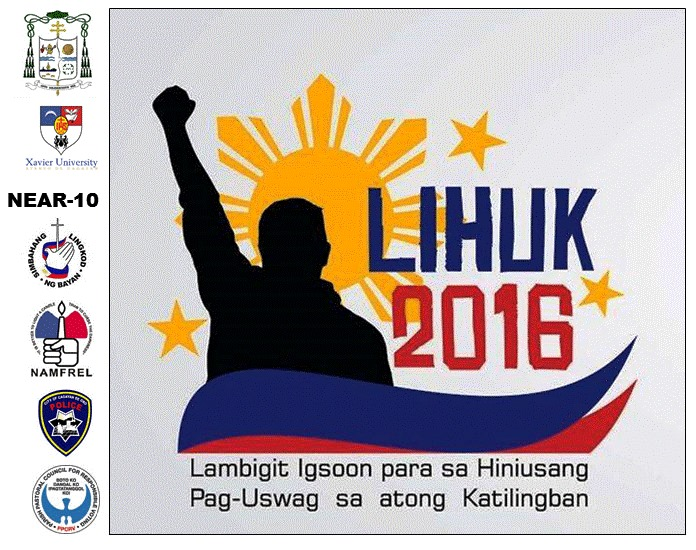
By Maria Monica L Borja and Caryl Be B Trabadillo
Lambigit Igsoon para sa Hiniusang Pag-uswag sa atong Katilingban (LIHUK) has begun its electoral education campaign for the 2016 national and local elections.
LIHUK, which also means “act” or “move” in Bisaya, is a multisectoral network of concerned and active electoral advocates in Cagayan de Oro, with members coming from the church, academic institutions and non-partisan government agencies. LIHUK’s call is “Barug Kagay-anon alang sa Tiunay nga Piniliay” (Stand up, Kagay-anon, for truthful elections).
Advocacies
Xavier University’s Kristohanong Katilingban sa Pagpakabana - Social Involvement Office (KKP-SIO) and the National Service Training Programs (NSTP) in all Misamis Oriental schools are active members of the network.
NSTP classes encompassing CWTS, LTS and ROTC started their community involvement using the network’s module prepared in partnership with Simbahang Lingkod ng Bayan of Ateneo de Manila University, civil society organizations, religious groups and other academic institutions.
The first phase of the four-phase module is Kwentuhang Bayan, a voters’ education trainers’ training, which seeks to increase voters’ awareness on local electoral issues. The first round of Kwentuhang Bayan was conducted in May at XU participated in by different sectors from CDO. Another round of discussions will be held from November 23-27 in Agusan National High School, Lourdes College and St John Vianney Seminary.
The second phase is the poll survey. It will involve criteria building, agenda building, candidates fora, and candidates profiling, which LIHUK intends to disseminate to help voters arrive at a wise and honest decision.
In partnership with the National Citizens' Movement for Free Elections (NAMFREL) and Parish Pastoral Council for Responsible Voting (PPCRV), LIHUK volunteers will be deployed to help in election monitoring, which comprises the third phase. Post-election, LIHUK hopes to still keep a watchful eye on the elected officials through Bantay Pangako, the last phase which entails establishing a mechanism for checking whether the officials followed through their promises during the elections.
LIHUK also supports Clean Honest Accurate Meaning Peaceful Election (CHAMP), an advocacy against vote-buying and political dynasties of the Archdiocese of Cagayan de Oro City.
The network plans to open its lines for the recruitment of new volunteers on November 23. A gathering of new volunteers will be held on November 28, and a general assembly and commitment pledge on December 13.
Catalysts of change
Nestor Banuag, KKP-SIO director and one of the leaders behind this movement, shared that one of his passions is to influence the youth to be part of community development. “I want to influence the new generation, introduce them to ways they could contribute to our community using the technologies we have today.”
Banuag said that LIHUK is trying to adopt new methods to win the hearts and minds of fellow voters and provide reports to the community.
“The challenge now is how to be creative and effective because the number of voters’ turnout is getting fewer and fewer. Some people say that nothing will change even if they vote, that there is no progress or that their contributions [mean nothing].”
He also added that poverty is one of reasons behind the difficulty in ensuring clean and honest elections. Some voters will choose the candidates who will pay the most for their votes. This is one of LIHUK’s challenges, for the voters to believe that every vote is important, to recognize that their votes are “sacred” and that voters have the right to know each candidate.
“The results of the 2016 national and local elections will manifest the desire of each Kagay-anon, the desire to choose their leaders freely and openly,” hoped Banuag.
He challenged all the candidates “to preserve the purity of the election period and to listen not just with their ears, but also with their hearts for them to hear the cry of the poor.”
“As voters, we are also part of this whole process of transformation. We are not just here to vote. Our vote is our future,” he shared.